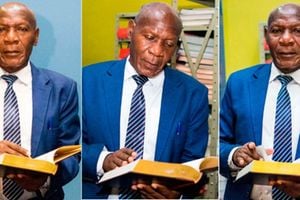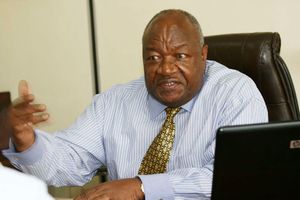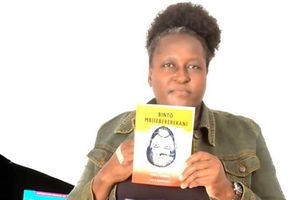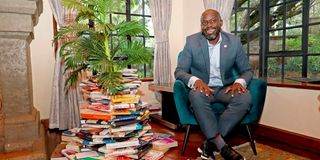
Frank Molla, Managing Director of payments firm MDP Africa during the interview at his home in Nairobi on March 25, 2024 .
Mark Ocitti is comfortably seated in his living room as he proclaims: “My life is out of an experience of the many books that I’ve read.”
On another side of the city, Frank Molla is seated cosily beside a pile of books as he tells us: “Tell me any single successful leader that never reads. There isn’t.”
On yet another end of the capital, Mary Wangari Wamae is decked at her home library that sometimes serves as her home office when she tells us: “I’ve read books on growing my emotional intelligence, growing my strength in areas that you are not naturally gifted…You create the right habits out of the information that you get from those books.”
Lifestyle visited the homes of the three top business executives, who are voracious readers. We had a particular interest in their home libraries.
When we sat down for a chat, it emerged that each of them had a different introduction to the world of books. However, they have a similar objective for reading — to expand their horizons and to stay on top of their game.
Mark Ocitti: Managing Director, Kenya Breweries Limited (KBL)
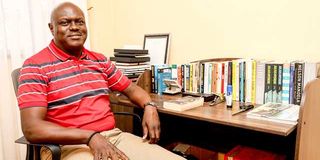
Kenya Breweries Limited Managing Director Mark Ocitti during the interview at his home in Runda, Nairobi on April 7, 2024.
Hailing from Gulu in northern Uganda, Mr Ocitti is a relative of famed author Okot p’Bitek, the writer of Song of Lawino among other works.
Mr Ocitti says Okot, who died in 1982, is his uncle. That, in part, may explain why he is into books.
“You can say reading literature flows in the blood,” he chuckles.
He remembers being a fan of books from a very young age.
“I was one of the only people in my class that liked to go and borrow books from the library,” he says.
He remembers reading book series like the Hardy Boys and Barbara Kimenye’s “Moses” books. The “Tin Tin” comics also made part of his early reading list. He also remembers reading many titles under the African Writers Series.
“Because I liked reading, one of my favourite subjects in my ‘O’ levels was literature, because then I got the opportunity to read books as part of the academic programme,” says Mr Ocitti.
Prior to joining KBL’s parent company, East African Breweries Limited in 2014, Mr Ocitti worked with Shell and also with Airtel.
His reading interests have evolved. He started off as a heavy fan of fiction but is nowadays more interested in biographies and autobiographies.
“I’ve read a lot about Nelson Mandela, to a point where I think I can recite his life. I know him. I almost feel like I know him personally. I’ve read a lot about Julius Nyerere now, and his vision for Tanzania and his contribution to the nation building of Tanzania and East Africa as well,” he says.
He is also drawn to history books, listing titles like Into Africa as some of the most memorable.
“I like to read a lot about the explorers into Africa, people like Vasco da Gama, people like Henry Morton Stanley, David Livingstone. And I’ve read a lot of books that historians have written about them, how they came into Africa and the things they did,” he says.
Mr Ocitti also reads books on leadership.
“(I read) books written by people who have experienced leadership and the things that help them win, like the lessons they’ve learned. And I think sometimes just reading those gives me a feel for how to handle certain situations in the office. And it’s based on those that I then write my own leadership articles,” says the MD.
When we ask him whether there is a business leadership book he can recommend, he says he can’t pinpoint a single title.
“There are books that give you real-life examples of how big leaders have handled certain situations and come out of them,” he says.
His most favourite book is titled Shantaram, a 2003 novel by Australian author Gregory David Roberts. It is more than 800 pages long. He has read it two times and wants to read it a third time.
“When I got it, I could not put it down because it’s about real life. It’s about his experiences and it just brings into perspective the different lives that people live and how different they are, but at the same time how similar they are to the experiences and lives that we live as well,” says Mr Ocitti, who reads over the weekends, mostly on Saturday and Sunday mornings.
“That’s when I have peace of mind. I’m free from the pressures of the office, I’m not thinking of (business) issues,” he says. “When I’m not golfing on the weekend, I’m reading.”
He has spent quite a fortune on books, but he draws a blank when we tell him to approximate the number of books he owns. He borrows from the Maasai spirit of never counting one’s cattle.
“I don’t know how many I have. There must be hundreds. I’ve never counted them,” he says.
His main library is in his Kampala home, but his Nairobi one also has a decent collection.
Among his most expensive books is a title he had just bought when we had the interview. This is Bibi, the autobiography of Israeli Prime Minister Benjamin Netanyahu.
“It would probably be among the most expensive that I’ve bought before,” he said.
He had not started reading it as he was engrossed in Chimamanda Ngozi Adichie’s 2013 novel, Americanah.
“She’s a great storyteller and some of her stories, although fictional, are almost real-life. And they make you sort of examine the kind of life that you live,” he said of the author.
The genre Mr Ocitti struggles with is motivational books.
“I find that more often than not, they’re written by people who have not experienced what they’re writing about, and they come from a very theoretical point of view. So, sometimes they can be misleading,” he says. “The one that I have read, though, that I really liked is a small book called Who Moved My Cheese? I think that’s probably the only motivational book I’ve ever read, and I found it quite intriguing.”
His reading has influenced the decisions he makes: “I have sometimes referred back to leadership experiences that I’ve read about.”
Are you the parent who wants their children to read and share a summary? Mr Ocitti doesn’t subscribe to that method of introducing children to books. He says his two daughters became readers naturally.
“I’ve never done that, because then it becomes a job to them, and you could push them away from it. It becomes another school thing. So, I’d rather they just develop the interest themselves, which is what they have done,” says Mr Ocitti.
He detests e-books and audiobooks.
“How do you even call it reading?” he asks of the two formats.
Mary Wangari Wamae: Outgoing Executive Director, Equity Group
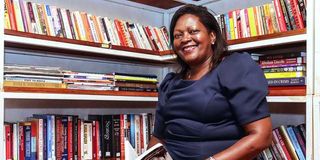
Equity Group Holdings Limited Group Executive Director Mary Wangari during an interview at her home in Karen, Nairobi on June 7, 2024.
She remembers getting hooked on the folklore stories she read as a young schoolgirl. The tales that had ogres, hyenas, tortoises, hares, forests and all that.
“Some of them were school-related but some were out of leisure reading and I got into the habit of reading,” Ms Wangari tells Lifestyle.
She never dropped that liking for books, even when she joined the University of Nairobi to study law.
“When I went to the banking space, I took it upon myself to read books that helped me, first of all, to understand strategy in growing a business,” she says.
She has read a great deal of books that rest in the self-help or motivational category.
Good to Great by Jim Collins, Built to Last (Jim Collins and Jerry I. Porras), Who Moved My Cheese? (Spencer Johnson), The Hard Thing about Hard Things (Ben Horowitz), The Leader with No Title (Robin Sharma), Lean In (Sheryl Sandberg), The Psychology of Money (Morgan Housel) , Atomic Habits (James Clear), The 5am Club (Robin Sharma) and Eat That Frog (Brian Tracy) are among the titles she has found to be of great help.
The motivational book genre isn’t everyone’s cup of tea, and Ms Wangari thinks she knows why.
“I think what we are dealing with right now is that a lot of the self-help material is driven by commercial considerations,” she says, giving an example of how one can get tens of conflicting material on YouTube on a topic like weight loss.
“There are some books that have been written because they are trying to make a commercial proposition for the product they are selling. So, that could be the reason why he has that position. But I also believe that you have to be careful. Even when I read these books, sometimes I don’t pick all the lessons because there are some that I feel don’t apply to me in my circumstances. Also, remember that there is no one-size-fits-all solution for some of these things,” she says.
Ms Wangari joined Equity in 2004 after years in private practice. She has held positions as the group’s director of corporate strategy and the company secretary before she rose to her current role in 2018. Effective Friday, she took early retirement from her post as a director at the group.
In 2020, she founded a movement of women readers at Equity Group, called the Equity Inspire Programme (Equip).
“The aim is to encourage the women in the bank to go for leadership positions and grow their confidence in leadership because sometimes the women are constrained when it comes to leadership,” she says.
The group has read three titles so far. The first one they read was The Leader with No Title. Then they read Lean In and now they are on The Psychology of Money.
To any female CEO or a woman going into leadership, she recommends Lean In and another book titled Take Charge by South Africa’s Nyimpini Mabunda. She also recommends Good to Great.
“It’s been there for quite a long time, but I still believe that if you want to grow and perfect your business leadership, you still need that book,” she says.
Many factors influence what book Ms Wangari buys, among them the book’s title and blurb. Also, she considers what she is dealing with in her life.
She also buys based on the author, saying she bought books by former US president Barack Obama and the late environmentalist Wangari Maathai using that criterion.
“Wangari Maathai is my role model, and she’s one of the women that I’ve really admired in life and death, and that I have modelled my life around principally on a very good number of aspects,” she says.
She sometimes buys books in airports while travelling. She typically buys them for between Sh1,500 and Sh3,000, though forces like the exchange rate have seen her pay more for some titles.
Ms Wangari is one of the book lovers who have ventured into authorship. Her autobiography, The Village Girl, was released last year to resounding acclaim.
She says it all started when the Business Daily ran her profile. It was compressed into a single page and many told her they wanted to get the full story.
She felt the time was nigh for her to write her story.
“I asked myself, ‘Is it really fair for me, if God calls me today, to go down with all the knowledge that I have experienced and the experiences that I have amassed over the years?’ Because it’s a lot. In my role, I have experienced quite a lot. I’ve seen Equity grow from small to what it is right now. That is how I decided to write a book,” she says, adding that it took two years to put the book together.
Through the book, she notes, she has debunked the myth that Kenyans don’t read.
“The response is beyond amazing, beyond my expectation,” she says.
Of all the titles she reads, Ms Wangari has little time for fiction.
“I really don’t have time for that,” she says, laughing. “I don’t remember reading fiction in any serious form.”
She also prefers physical books to audiobooks and e-books.
“For instance The Psychology of Money, I had it on Kindle, but when I found it at Bookpoint, I bought a physical copy. I feel more comfortable with the physical book,” she says.
Frank Molla: Managing Director, Masria Digital Payments (MDP)

Frank Molla, Managing Director of payments firm MDP Africa during the interview at his home in Nairobi on March 25, 2024 .
He is the Africa head at MDP, a firm from which many banks source their ATM cards.
Mr Molla became a book lover only recently. He confesses that he never used to be the best student in class and that his parents educated him only up to Form Four.
After high school, he took up many jobs, among them being a matatu driver, a deejay, and a garbage collection merchant, and a mechanic, among others.
His stars aligned, and he got into the banking space even without a university education. He worked with Barclays Bank, American Express, MasterCard, BPC Banking Technologies, and then MDP.
His entry into book reading started with a Zig Ziglar book that contains only famous quotes.
“It was an easy read that I kept on reading all the time. And I think that’s when I started reading. And then, as I started working, I realised that I was not getting a chance to go to the university, I also figured I needed to start some personal development. I strongly believe in personal development,” says Mr Molla.
He tried getting a degree but gave up when he realised it was too much work. He has, however, taken short courses from various institutions, from Strathmore in Kenya to Harvard in the US.
His zeal for reading has only kept rising. So much so that, when asked about the most expensive book he has ever bought, he said he has even spent money to attend book launches abroad.
“I (can fly) to the US or the UK for the launch of a book,” he says. “So, the cost of that is beyond the cost of the book.”
Would you like to borrow a book? Sorry; Mr Molla will not give it to you.
‘I’d rather buy you a book. So, every time I buy a book, I buy two or three, because I know somebody will borrow,” he says. “It’s because I scribble.”
Related to scribbling, Mr Molla also has the habit of taking down notes on his phone as he reads. He has notes going as far back as 2012.
“I write on my phone all the things I pick from a book,” he says. “When I am travelling or I have free time, I just open my phone and I’m reading…It’s like I’m creating my own book from many books because I have those highlights.”
Mr Molla also does not have a favourite genre. He tends to mix all, and his policy is that at any given time, there are at least two books he is reading.
“Sometimes the reason why people don’t read is because they pick genres that are boring,” he says. “At any given time, I will have two to three books I’m reading at the same time, in different genres. If I’m bored with this, I pick another one. It activates my brain.”
He mostly reads when he is travelling.
“Almost 70 per cent of my time is always spent travelling. I will spend a lot of time on the plane,” he says.
His policy on a good book is that it should share something he can apply.
“If you read for the sake of knowledge, then to me, I think there’s nothing you’re doing. You need to read so that you can apply it,” he says.
Out of his love for books, Mr Molla joined the Men’s Book Breakfast Club that began during the Covid-19 period.
“We are among the first people to start it. Today, it has over 7,000 men reading,” he says.
The club identifies a book to be read every quarter. They wake up to read at 7.30am every Saturday.
The club also holds sessions where readers can hear people share their stories or discuss books. They have hosted several business executives.
Mr Molla is happy that reading and the Book Breakfast Club meetings have improved his mastery of the English language.
“That’s the beauty of reading. It improves your vocabulary and improves your written speech. It just makes you stand out,” he says.
“Tell me any single successful leader that never reads. There isn’t. I’m yet to come across one. There isn’t. Look at [former US President Barack] Obama. Every year, he publishes his best books. Bill Gates, the same thing. We are talking about real success, not corrupt success,” he says.

